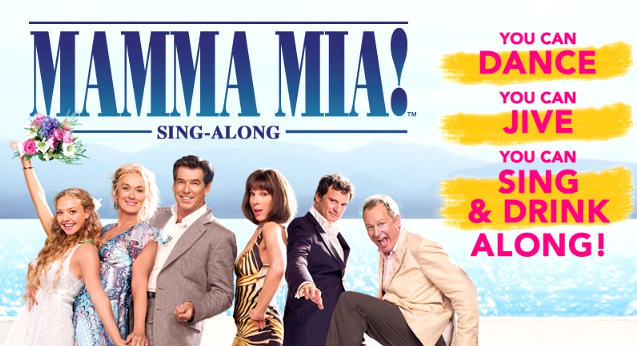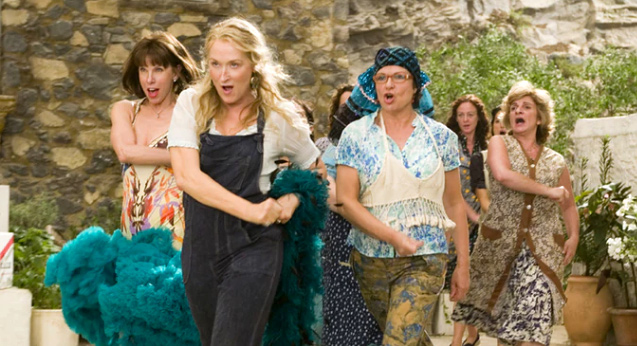I went to a Mamma Mia! Sing-Along screening. The audience were great, but the film was torture

Five years ago I interviewed Marlon Wayans, and made the mistake of telling him that one critic had claimed they would prefer to be waterboarded than to rewatch the comedian’s execrable 2013 film A Haunted House. Wayans was unimpressed, saying he would love to see the reviewer undergo precisely that experience. I now know that a far harsher punishment exists: sending the critic to a Mamma Mia! Sing-Along screening. Not even the darkest and most depraved soul – not even the world’s snobbiest, most hoity-toity, holier than thou critic – deserves, as I discovered on the weekend, to suffer such an experience.
Around me are 70 or so ABBA superfans, almost entirely female, congregated in a cinema on Mother’s Day. I had hoped, going into this screening, to be inundated with fabulousness, my mind conjuring images of rainbow-coloured drag queens tossing confetti on me as I entered the auditorium. I suspected this film was not going to be my cup of tea, but a recent screening I hosted of The Rocky Horror Picture Show, attended by its director Jim Sharman, had given me a renewed taste for audience participation movies. So, why not? What could I possibly have to lose?
As it turns out: my sanity. But we’ll get to that in a moment. Disconcertingly, the audience barely stirred during the film’s opening number, which involves Amanda Seyfried on a rowboat singing I Have a Dream. Seyfried plays Sophie, who lives on a Greek island in hotel ran by her independent, dungarees-clad mother Donna (Meryl Streep). Sophie has secretly invited three of Donna’s old flames to her wedding: Sam (Pierce Brosnan), Harry (Colin Firth) and Bill (Stellan Skarsgård). One of them – she doesn’t know which – is her father. The three men arrive, envisioning a lovely sun-kissed weekend. They have no way of knowing the nightmare that awaits.
It’s fingernails down the blackboard stuff, but the crowd dig it. It’s clearly their love of ABBA that brought them here.
The script, written by Catherine Johnson, unconvincingly attempts to make the songs relevant to key dramatic moments, the whole thing feeling terribly forced. When Donna spots her old lovers hiding in the attic, for example, she reacts by running away and belting out “I’ve been cheated by you since since I don’t know when!”, leading into a rendition of the titular track. It’s fingernails down the blackboard stuff, but the crowd dig it. It’s clearly their love of ABBA that brought them here.
The timidity the audience showed during the opening number has evaporated; people are now rising from their seats, like they’re being pulled by magnetic force. One small group congregates in the aisle. Several others stand up to dance, then awkwardly sit down again once they realise they’ve obscured the view of the people behind them. One woman with dyed blue hair jabs viciously at the air, as if her right index finger is popping dozens of invisible balloons. Her face is an expression of unadulterated joy; the look of somebody who just wolfed down a large quantity of ecstasy then French kissed a supermodel. Her energy is infectious. I can’t help but smile and think: this isn’t so bad after all.

Then the singing stops, the audience settle, and the damn film continues. It chugs ahead with corny drama, mawkish sentiment and grotesque interpretations of acting, lurching from one poorly written exchange to another. The sound of the crowd singing helps drown out the sound of the actors, who, bafflingly, were somehow allowed to sing in their own voices – and man, those voices are rough (Pierce Brosnan’s performance was subsequently acknowledged with a Razzie award for Worst Supporting Actor). But when they speak rather than sing, nothing from the crowd drowns them out. The naked wretchedness of this interminable film is laid bare.
Director Phyllida Lloyd regularly reverts to the same basic approach for the staging of musical sequences, whereby the first couple of verses are performed as exchanges between two or three characters, then for the end of the song a huge rent-a-crowd arrives out of nowhere to communally deliver the final moments, some of them involving dancing on a pier. As the end approaches, I have a splitting headache. The pretty settings long ago lost their lustre; despite a presumably decent-sized budget, it’s clear Lloyd shot the film on only a handful of locations. When Brosnan starts singing about how he is not too old for sex, I decide I’ve had enough and make a beeline towards the exit.
The crowd, whose energy had dipped when the ‘serious’ elements of the final act distracted them from the singing and dancing, suddenly springs back to life for the iconic Take a Chance on Me.
As I open the door, a voice cries out from the speakers, perfectly timed to correspond with my actions: “If you change your mind…” The crowd, whose energy had dipped when the ‘serious’ elements of the final act distracted them from the singing and dancing, suddenly springs back to life for the iconic Take a Chance on Me. I stand still for a few minutes, observing these fascinating creatures in their nerve-jangling natural habitat. When the hotel springs a leak, causing the guests to be drenched in water and Brosnan to take his shirt off, I again decide it’s time to leave. The audience had given so much to this film and received so little in return.
Why had I put myself through this? The short answer is that I strongly believe a critic’s job is not just to pursue their own tastes, but to at least attempt to encapsulate the breadth of the cinematic experience. This attitude has led me to consume great art I might not have discovered otherwise, such as Captain Underpants: The First Epic Movie – one of the best, most inventive films released last year. It also led me to the colourful but, shall we say, underwhelming My Little Pony: The Movie. And also to A Haunted House, the rinky-dink Marlon Wayans vehicle mentioned at the start of this article.
As I walked home from the Mamma Mia! Sing-Along, pondering what has become of my life, I thought about that interview with Wayans. There was something I had neglected to tell the comedian. It was me. I was the critic who made the comment that offended him, about how being waterboarded would be better than sitting through A Haunted House for a second time. It was, in hindsight, a reckless and stupid thing to say. Perhaps Wayans can take some comfort in the knowledge that karma came to get me, in the form of the Mamma Mia! Sing-Along. The crowd made this excruciating film temporarily tolerable; watching it alone would be torture.














